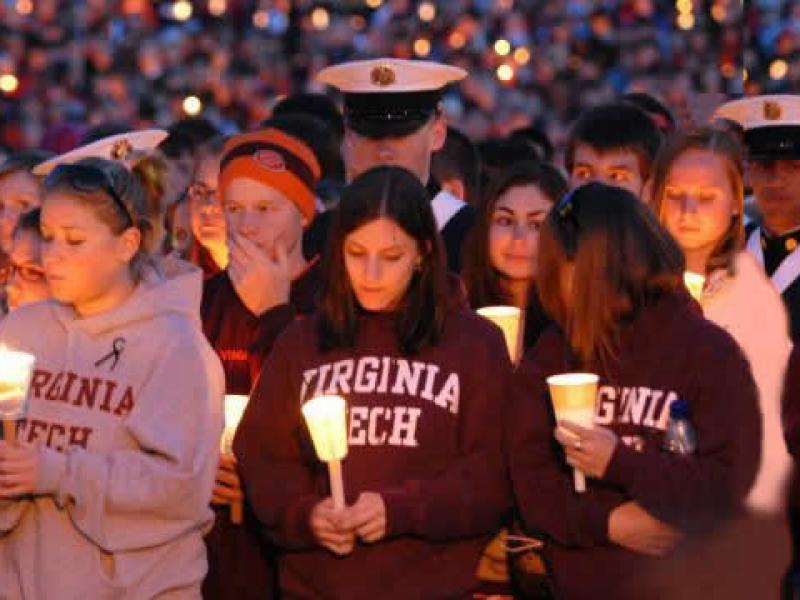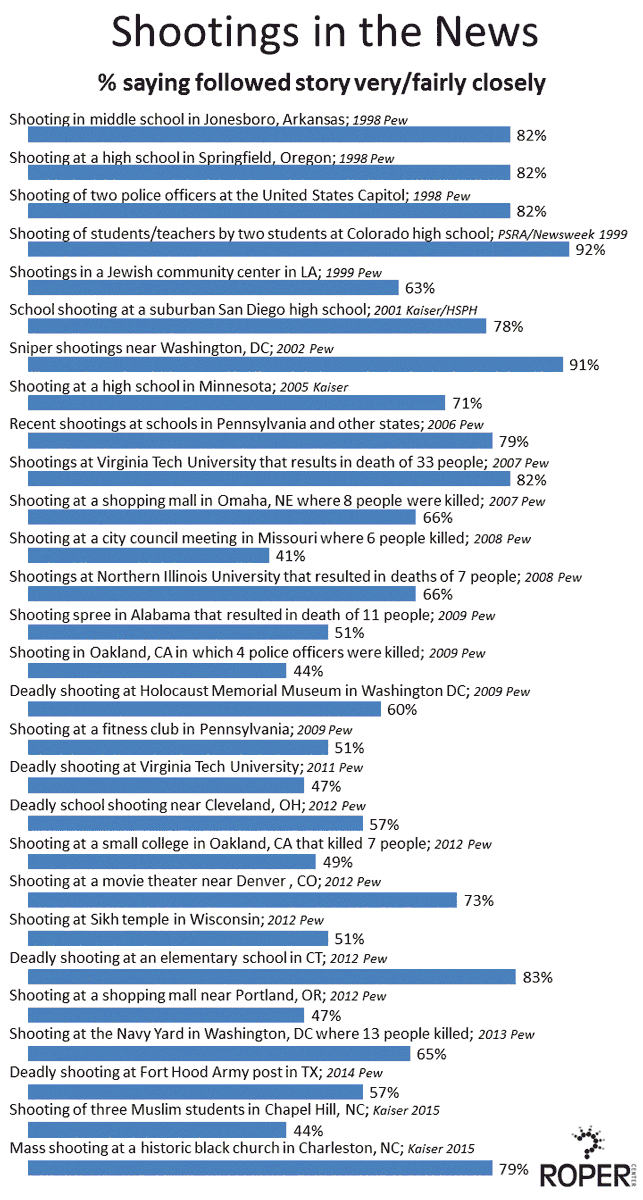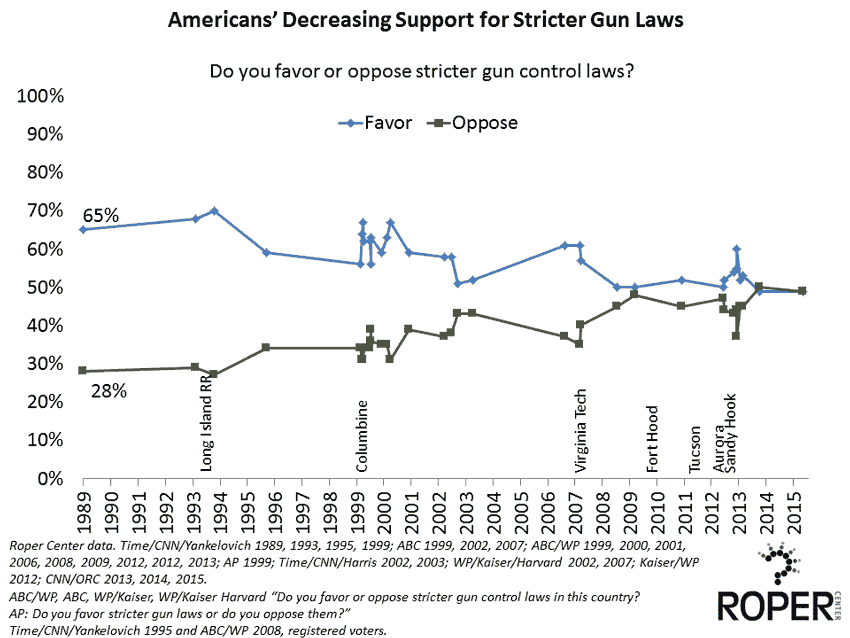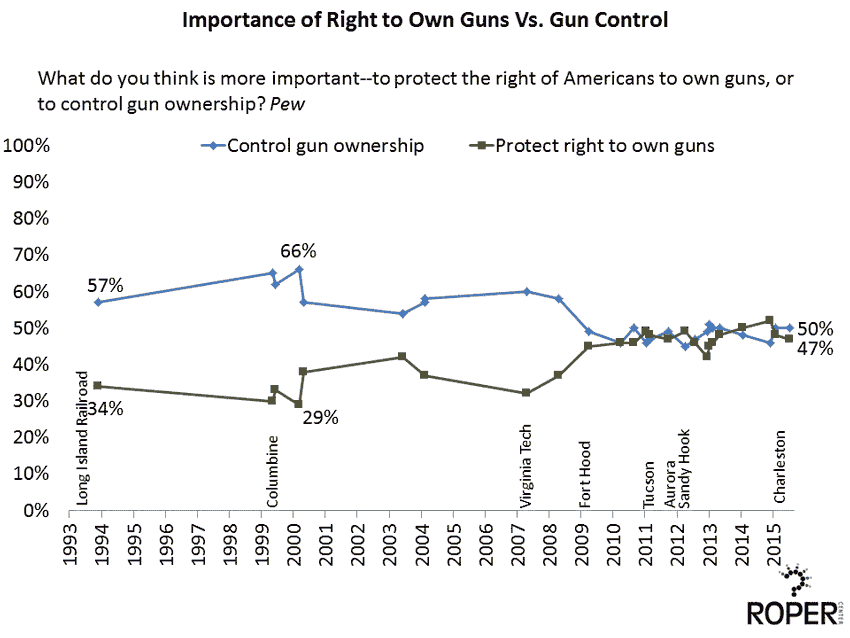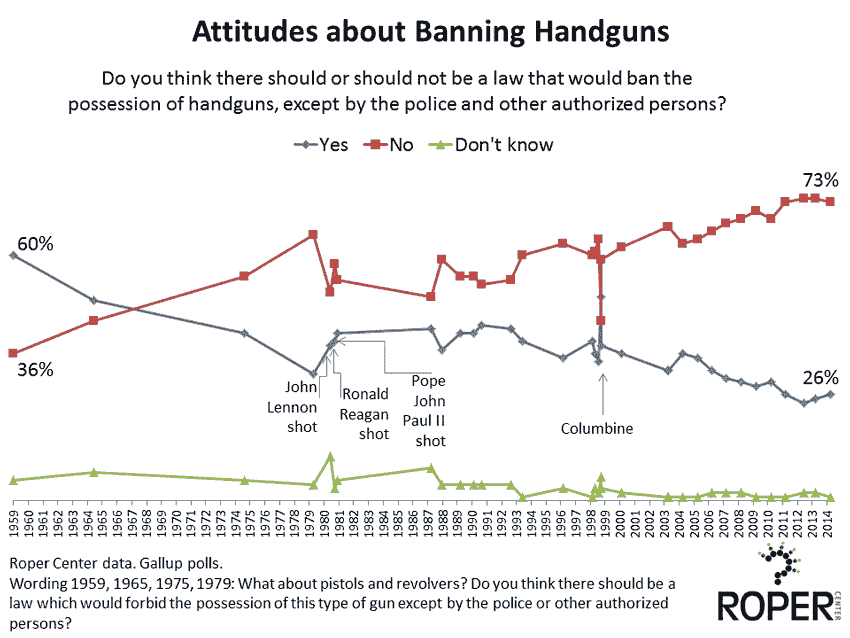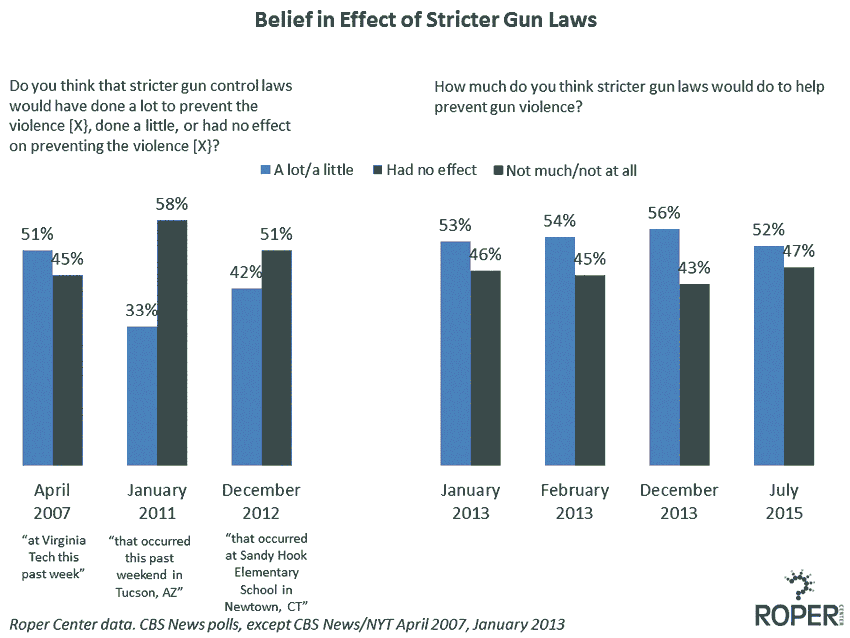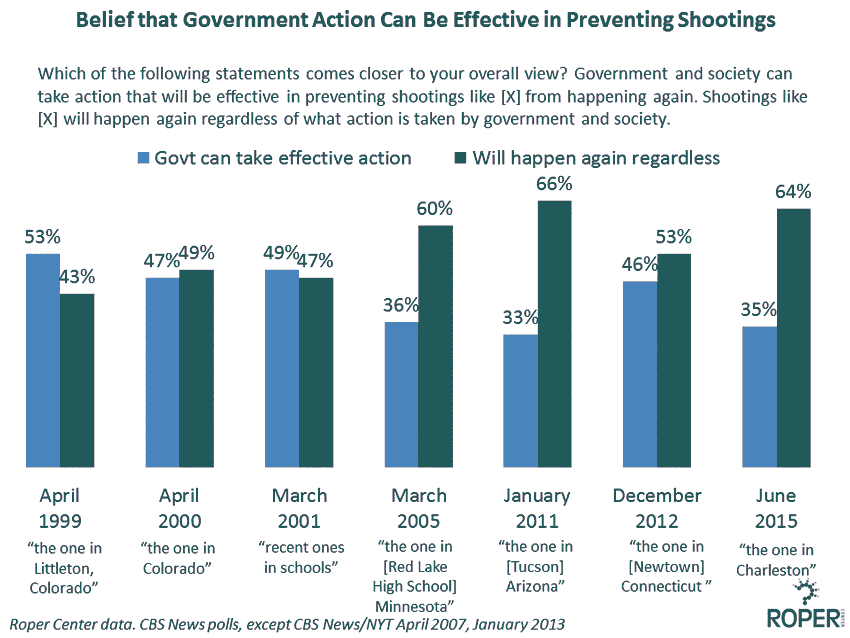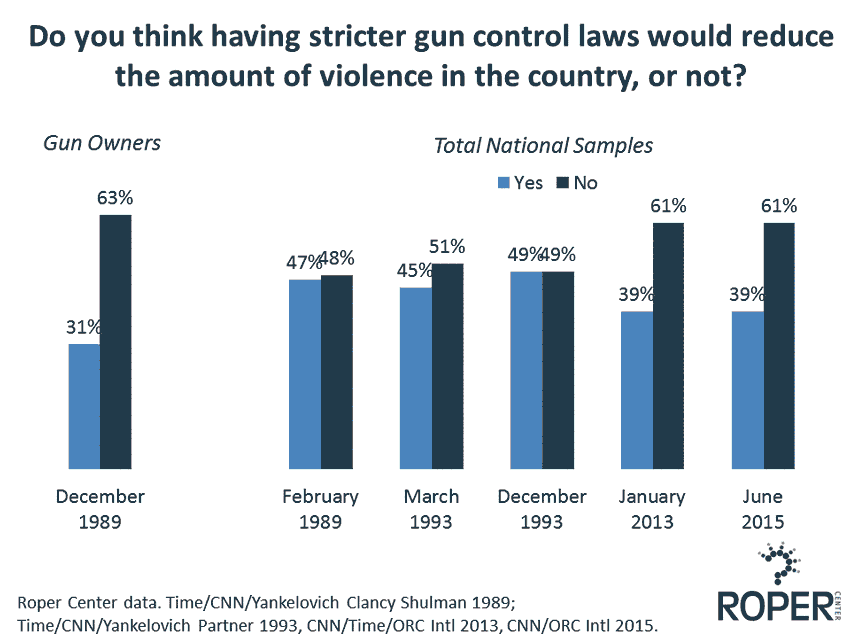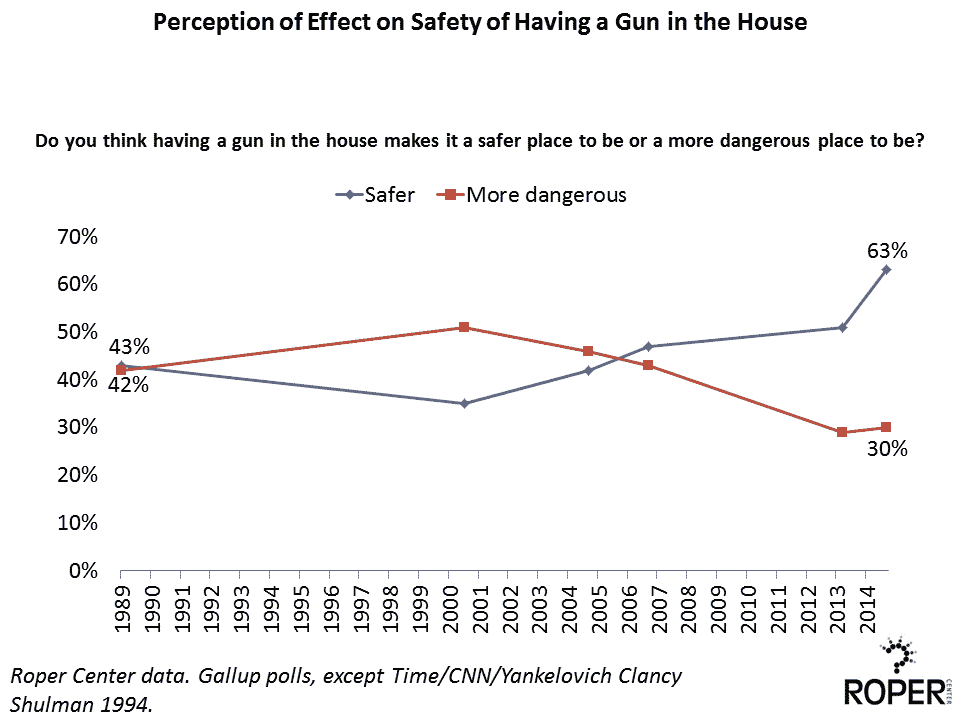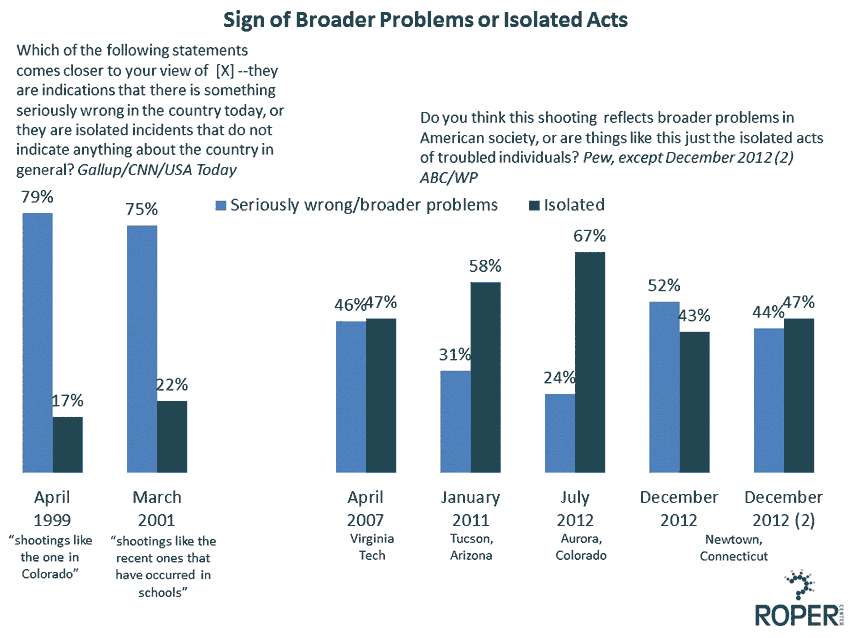Last week the country was shocked by the on-air shooting of a reporter and cameraman - shocked, but perhaps not surprised. Gun violence has become an all-too-common part of the news, and after each incident, a debate erupts over gun control. Public opinion data over more than fifty years reveals a country ever less willing to restrict gun ownership, even as mass shootings and other high-profile shooting incidents continue to make news. From the Roper Center for Public Opinion Research archives:
Tragedy in the news. Again.
Gun-related homicide deaths have been decreasing in number since the 1990s. But the number of active shooter events and mass shootings have increased in recent years. Such terrible events make headlines. Pollsters have asked the public about their attention to news stories about these tragedies since 1998. While many stories of national-reported shootings are followed very or fairly closely by half or less of the public, some such incidents gain the attention of eight in ten or more.
Decreasing support for stricter gun laws
These incidents are occurring at a time of notable change in public opinion on gun control. In polls since 1989, decreasing proportions of Americans have said they favor stricter gun laws. Although high-profile incidents can increase support briefly, the cumulative effect of the increasing number of mass shootings does not appear to be higher support for restrictions on guns.
The same trend can be seen in public attitudes about the importance of controlling gun ownership versus the right to own guns. The country is about evenly divided on this issue at the moment, while only fifteen years ago, a majority believed controlling gun ownership was more important. Gun owners are more likely to say protecting the right to own guns is more important. In a 2013 Pew poll, 72% said so, versus 30% of those living in a household with no gun. It is worth noting, therefore, that this decline has occurred despite a simultaneous decline in gun ownership rates.
The data on public opinion about handguns in particular goes back to the 1950s and reveal the magnitude of changing American attitudes about guns. More than twice as many Americans in 1959 said that handguns should be banned than said so in 2014. While there have been occasional rises in the proportion of people saying that there should be a ban, such as immediately following the shootings of John Lennon, Ronald Reagan and Pope John Paul II and following Columbine, the overall trajectory has continued away from banning handguns. The country is now nearly equally split on this issue. Banning assault rifles is similarly divisive: in a 2012 Gallup poll, 44% were for and 51% against a law that would do so.
Americans do want some limits on possessing guns. In a 2014 Pew poll, 49% said that it was more important to protect the right to own guns than to control gun ownership; but among those who said so, 76% said there should be some restrictions on gun ownership. Background checks are supported by most Americans; in a 2015 CBS poll, 88% favored background checks for all gun buyers. A 2015 Pew poll found 70% of the country supported a federal database of gun sales.
How do high-profile shootings affect attitudes about gun control?
A slight majority in polls since 2013 have said that stricter gun laws would do at least a little to help prevent gun violence specifically. However, polls in the wake of national tragedies like the slaughter of schoolchildren in Newtown, CT found the country uncertain as to the effectiveness of gun control laws in averting such crimes. After the shootings in Tucson and Sandy Hook, majorities believed that stricter gun laws would have had no effect in preventing the violence that occurred.
In fact, Americans have become less convinced that anything at all can be done to prevent this sort of gun violence. A slim majority after the Columbine shootings thought that government and society could take action that would be effective in preventing shootings like that one from happening again. But after mass shooting incidents in recent years, up to two-thirds of the country have said that such shootings will happen again regardless of what action is taken. In a 2014 AP/GfK Knowledge Networks poll, just 8% of the country wre extremely or very confident that the U.S. government can effectively minimize the threat Americans face from mass shootings, while 25% were moderately confident and 63% were not too or not at all confident.
Multiple poll questions show that Americans have become increasingly skeptical that gun laws can do much to stem the tide of violence. In 1989, the public was divided on whether stricter guns law would reduce the amount of violence in the country. In polls in the 2013 and 2015, a majority said they would not. On this measure, the attitudes of the country overall have come in line with attitudes of gun owners in 1989.
On a personal level, most Americans have also become convinced that a gun in the home brings more safety than risks. The perception that guns increase personal safety may have the effect of making mass shooting incidents seem more of an argument against than for gun control. In a 2015 Pew poll, 54% of the public said that gun ownership in this country does more to protect people from becoming victims of crime; 40% said it does more to put people at risk.
Troubled individuals or a troubled society?
After Columbine and other school shootings in 1999 and 2001, the public was asked if these events were indications that something was seriously wrong in the country or isolated incidents that do not indicate anything about the country in general. A strong majority of Americans saw something seriously wrong. After more recent incidents, the country has been asked whether a shooting reflects broader problems or is just the isolated acts of troubled individuals. In some cases the public has been divided (Newtown and Virginia Tech); in others, firm majorities say these are isolated acts (Tucson and Aurora).
Those who hope that changing gun laws can help to prevent shootings incidents like last week's on-air homicide or the murder of nine people in the church in Charleston in June have to overcome significant barriers in American attitudes. Those who argue that gun laws are ineffective, that these events are isolated incidents, and that guns bring more safety than danger appear to be winning the public debate.
